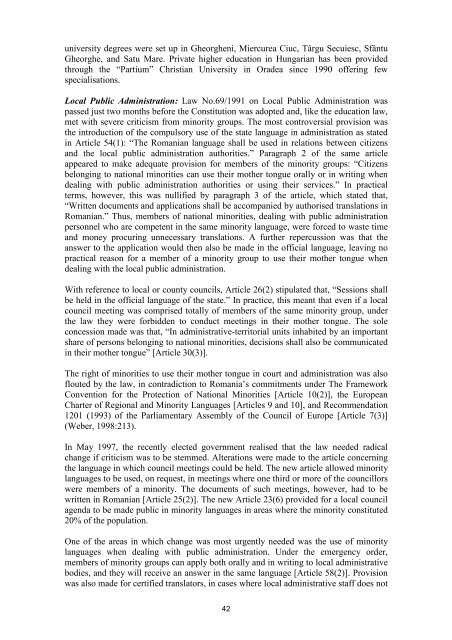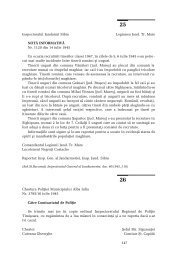Southeast Europe
Southeast Europe
Southeast Europe
You also want an ePaper? Increase the reach of your titles
YUMPU automatically turns print PDFs into web optimized ePapers that Google loves.
university degrees were set up in Gheorgheni, Miercurea Ciuc, Târgu Secuiesc, Sfântu<br />
Gheorghe, and Satu Mare. Private higher education in Hungarian has been provided<br />
through the “Partium” Christian University in Oradea since 1990 offering few<br />
specialisations.<br />
Local Public Administration: Law No.69/1991 on Local Public Administration was<br />
passed just two months before the Constitution was adopted and, like the education law,<br />
met with severe criticism from minority groups. The most controversial provision was<br />
the introduction of the compulsory use of the state language in administration as stated<br />
in Article 54(1): “The Romanian language shall be used in relations between citizens<br />
and the local public administration authorities.” Paragraph 2 of the same article<br />
appeared to make adequate provision for members of the minority groups: “Citizens<br />
belonging to national minorities can use their mother tongue orally or in writing when<br />
dealing with public administration authorities or using their services.” In practical<br />
terms, however, this was nullified by paragraph 3 of the article, which stated that,<br />
“Written documents and applications shall be accompanied by authorised translations in<br />
Romanian.” Thus, members of national minorities, dealing with public administration<br />
personnel who are competent in the same minority language, were forced to waste time<br />
and money procuring unnecessary translations. A further repercussion was that the<br />
answer to the application would then also be made in the official language, leaving no<br />
practical reason for a member of a minority group to use their mother tongue when<br />
dealing with the local public administration.<br />
With reference to local or county councils, Article 26(2) stipulated that, “Sessions shall<br />
be held in the official language of the state.” In practice, this meant that even if a local<br />
council meeting was comprised totally of members of the same minority group, under<br />
the law they were forbidden to conduct meetings in their mother tongue. The sole<br />
concession made was that, “In administrative-territorial units inhabited by an important<br />
share of persons belonging to national minorities, decisions shall also be communicated<br />
in their mother tongue” [Article 30(3)].<br />
The right of minorities to use their mother tongue in court and administration was also<br />
flouted by the law, in contradiction to Romania’s commitments under The Framework<br />
Convention for the Protection of National Minorities [Article 10(2)], the <strong>Europe</strong>an<br />
Charter of Regional and Minority Languages [Articles 9 and 10], and Recommendation<br />
1201 (1993) of the Parliamentary Assembly of the Council of <strong>Europe</strong> [Article 7(3)]<br />
(Weber, 1998:213).<br />
In May 1997, the recently elected government realised that the law needed radical<br />
change if criticism was to be stemmed. Alterations were made to the article concerning<br />
the language in which council meetings could be held. The new article allowed minority<br />
languages to be used, on request, in meetings where one third or more of the councillors<br />
were members of a minority. The documents of such meetings, however, had to be<br />
written in Romanian [Article 25(2)]. The new Article 23(6) provided for a local council<br />
agenda to be made public in minority languages in areas where the minority constituted<br />
20% of the population.<br />
One of the areas in which change was most urgently needed was the use of minority<br />
languages when dealing with public administration. Under the emergency order,<br />
members of minority groups can apply both orally and in writing to local administrative<br />
bodies, and they will receive an answer in the same language [Article 58(2)]. Provision<br />
was also made for certified translators, in cases where local administrative staff does not<br />
42









